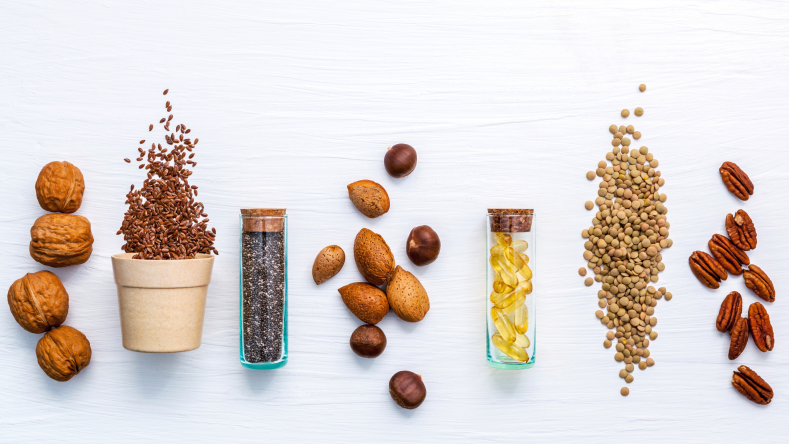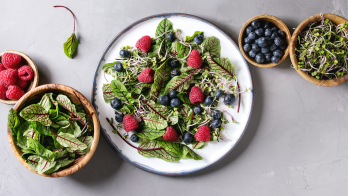The best immunity vitamins and supplements (according to Registered Dietitians)
Germs seem to be popping up everywhere you turn at this time of the year. So, what can you do to give your immune system the boost it needs? From vitamin D to zinc and echinacea, here are the best immunity vitamins and supplements, according to Registered Dietitians.

Get your kleenex ready! Germs seem to be around every corner at this time of the year. Fortunately, modern medicine is here to help. But other than turning to OTC medicine, what else can you do to reduce symptoms and even enhance immunity?
To help clear the air, we asked some Registered Dietitians to weigh in on their top supplement suggestions for immunity. From zinc to echinacea, here are the best immunity vitamins and supplements they recommend trying this season.

Vitamin C
Often thought as the “go to” nutrient for sickness, vitamin C has become the designated poster child for immunity. And for good reason! This nutrient is crucial to keep your immune defenses up and running, as it helps stimulate the production of white blood cells (also known as leukocytes) to help ward off viruses and bacteria [ 1 2
Dosing recommendations
The recommended daily amount (RDA) for adults is as follows [ 3
Children 1-3 years old: 15 mg
Children 4-8 years old: 25 mg
Children 9-13 years old: 45 mg
Males 14-18 years old: 75 mg
Females 14-18 years old: 65 mg
Males 19 and older: 90 mg
Females 19 and older: 75 mg
Smokers: 35 mg/day more vitamin C than nonsmokers
It’s also been found that doses of 200 mg/day or more may reduce the duration of cold symptoms [ 4 5

Sources
You can get vitamin C with high dose supplements, and/or include it in your diet by eating citrus fruits, bell peppers, broccoli, and strawberries. Registered dietitian Alayna Hutchinson recommends knocking back a nutrient-rich cocktail (a combination of potassium, sodium, and vitamin C) like orange juice, coconut water, celtic sea salt, and collagen to support your immune system.
Get vitamin C in your Elo Smart Gummies.

Zinc
Zinc is an essential trace nutrient in humans that plays an important role in immune health, as it helps your body develop and activate T-lymphocytes (subtypes of white blood cells). According to studies, zinc supplements might prevent and decrease the duration of respiratory tract infections by 33% if taken within 24 hours after symptoms begin [ 6
Dosing recommendations
The RDA for zinc is ~9 mg for women and 11 mg for adult men [ 7 Janet Coleman
Zinc toxicity may be possible (and can lead to a copper deficiency), so it’s advised to consult your healthcare provider before embarking on a high dose of zinc.
Sources
To reach your daily recommended levels, try adding zinc-rich foods, like red meat, shellfish, dairy, and cashews to your diet. If you follow a vegetarian or vegan diet, supplementation may be necessary to obtain the recommended amount of zinc.
Get zinc in your Elo Smart Gummies.

Vitamin D
Vitamin D is a fat-soluble vitamin involved in many important functions, including immune health. Since it can only be obtained through sun exposure and a few foods, many Americans are deficient in this vitamin. As such, a deficiency can wreak havoc on your health, as symptoms include risk of osteoporosis, elevated HbA1C levels, and a weakened immune system [ 8
Studies have shown a link between vitamin D deficiency and increased risk of infections and higher rates of autoimmune disease [ 9 10
Dosing recommendations
The RDA for people between the ages of 1 and 70 is 600 IU/day, and for adults over 70 the RDA is 800 IU/day [ 11 12 13
Learn more about how you can optimize vitamin D levels
Sources
You can get vitamin D from animal sources (like salmon, cod liver oil, sardines, and dairy products), fortified foods (such as orange juice and plant milks), and supplements.
Get vitamin D in your Elo Smart Gummies.

Probiotics
70% of the immune system is located in the gut, so it’s no wonder that probiotics are beneficial for immune support [ 14 Alicia Galvin
Research also supports this, as it’s been shown that probiotics contain several compounds which may promote immune function, modulate inflammatory responses, play a therapeutic role in viral infections (such as influenza), and might be effective in preventing COVID-19 [ 15
Dosing recommendations
The dose for probiotics is highly variable and ranges from 1 billion CFUs to 100 billion CFUs. Talk with your healthcare provider to determine the right probiotics for you and your needs.
Sources
Eating (or taking) a daily probiotic is important for gut health, which is why Registered Dietitian Jessica Dogert probiotic supplement
Get LactoSpore Probiotic in Elo Smart Gummies.

Omega-3 fatty acids
While fruits and vegetables have immune-boosting antioxidants like vitamins A, C, and E, research has found that omega-3 fatty acids have anti-inflammatory properties which may help fight off disease-causing bacteria and viruses [ 16 17
Dosing recommendations
While there is no official RDA for omega-3’s, experts tend to agree that 250–500 mg of combined EPA and DHA is enough to maintain overall health [ 18
Sources
For an immunity boost, incorporate plenty of healthy fats into your diet, such as those found in olive oil, salmon, walnuts, avocados, and chia seeds. To get her daily dose of omega-3’s, Hutchinson enjoys snacking on sardines smoked in olive oil
Colostrum
If you’re looking to boost immunity, then you may want to consider taking a bovine colostrum supplement, as it promotes gut health, enhances immune response, and has a high level of antibodies.
According to Galvin, colostrum contains oligosaccharides (a type of carbohydrate), which act as a prebiotic and fuels the good gut bacteria (such as lactobacillus and bifidobacterium) to help promote a healthy immune system. Additionally, studies suggest that bovine colostrum can influence immune cell activity with its antioxidant, antibacterial, and antiviral properties, which may prevent upper respiratory tract infections and improve gut health throughout life [ 19
While you can purchase bovine colostrum supplements online, it’s recommended to consult your healthcare provider before starting a new routine.
Echinacea
Echinacea is an herb that helps stimulate your immune system and can improve the way it responds to illness. This popular remedy has long been used in traditional medicine to reduce inflammation and enhance immune function, but studies show that taking echinacea may prevent upper respiratory infections and reduce the duration of symptoms [ 6
Dosing recommendations
Although there is no RDA for echinacea, research suggests that 450–4,000 mg/day (up to 4 months) can help prevent upper respiratory tract infections and shorten symptom duration [ 20
Sources
You can find echinacea in capsules, supplements, or even tea.
Elderberry
Some evidence suggests that elderberry supplements can ease cold and flu symptoms. This berry has many antimicrobial properties which may prevent the growth of certain types of strep bacteria and influenza viruses [ 21
Elderberry can be found in many forms, such as syrups, teas, capsules, and gummies. While there is no RDA for this berry, it’s recommended to follow the product manufacturer's recommended dosage.
Oregano oil
A little bit of oregano oil can go a long way for your immune system. Oregano oil can help ward off bacterial infections thanks to its antioxidant and antimicrobial properties. In fact, studies show that oregano oil has about 42 times the antioxidant level of apples, which may significantly improve immune response and structural integrity of cells and tissues [ 22 23
Moderation is key with oregano oil, since only three or four drops is enough to reap the antimicrobial benefits. While you can add this to your morning smoothie, Dogert says that she enjoys putting a few drops in her bone broth soup. Ana Reisdorf, MS, RD for Wellness Verge
Summary
These days, germs seem to pop up everywhere you turn. While OTC medicine is an option to reduce symptoms, supplements can also help shorten cold and flu symptoms and prevent recurrent episodes. Whether it’s vitamin D, zinc, or echinacea, try incorporating some of these supplements to feel your best this season.
Disclaimer: The text, images, videos, and other media on this page are provided for informational purposes only and are not intended to treat, diagnose, or replace personalized medical care.
Key takeaways
Zinc and vitamin C have been proven to shorten the duration of cold and flu-like symptoms.
Omega-3 fatty acids, echinacea, and oregano oil can reduce inflammation, which positively influences your immune cells.
Studies have shown a link between vitamin D deficiency and increased risk of infections and higher rates of autoimmune disease.
Probiotics contain several compounds which mediate immunoregulatory effects and offer therapeutic potential for treating illnesses.
Studies suggest that colostrum can positively influence immune cell activity with its antioxidant, antibacterial, and antiviral properties.
Oregano oil has about 42 times the antioxidant level of apples, which may significantly improve immune response and structural integrity of cells and tissues.
References
Vitamin C. Linus Pauling Institute. (2024, January 2).
https://lpi.oregonstate.edu/mic/vitamins/vitamin-C
Douglas, R., Hemilä, H., Chalker, E., D’Souza, R., & Treacy, B. (2004). Vitamin C for preventing and treating the common cold. Cochrane Database of Systematic Reviews.
https://doi.org/10.1002/14651858.cd000980.pub2
U.S. Department of Health and Human Services. (n.d.). Office of dietary supplements - vitamin C. NIH Office of Dietary Supplements.
https://ods.od.nih.gov/factsheets/VitaminC-HealthProfessional/
Heimer, K. A., Hart, A. M., Martin, L. G., & Rubio-Wallace, S. (2009). Examining the evidence for the use of vitamin C in the prophylaxis and treatment of the common cold. Journal of the American Academy of Nurse Practitioners, 21(5), 295–300.
https://doi.org/10.1111/j.1745-7599.2009.00409.x
Bucher, A., & White, N. (2016). Vitamin C in the Prevention and Treatment of the Common Cold. American journal of lifestyle medicine, 10(3), 181–183.
https://doi.org/10.1177/1559827616629092
Rondanelli, M., Miccono, A., Lamburghini, S., Avanzato, I., Riva, A., Allegrini, P., Faliva, M. A., Peroni, G., Nichetti, M., & Perna, S. (2018). Self-care for common colds: The pivotal role of Vitamin D, vitamin C, zinc, and echinacea in three main immune interactive clusters (physical barriers, innate and adaptive immunity) involved during an episode of common colds—practical advice on dosages and on the time to take these nutrients/botanicals in order to prevent or treat common colds. Evidence-Based Complementary and Alternative Medicine, 2018, 1–36.
https://doi.org/10.1155/2018/5813095
U.S. Department of Health and Human Services. (n.d.). Office of dietary supplements - zinc. NIH Office of Dietary Supplements.
https://ods.od.nih.gov/factsheets/Zinc-HealthProfessional/
Md Isa, Z., Amsah, N., & Ahmad, N. (2023). The Impact of Vitamin D Deficiency and Insufficiency on the Outcome of Type 2 Diabetes Mellitus Patients: A Systematic Review. Nutrients, 15(10), 2310.
https://doi.org/10.3390/nu15102310
Aranow C. (2011). Vitamin D and the immune system. Journal of investigative medicine : the official publication of the American Federation for Clinical Research, 59(6), 881–886.
https://doi.org/10.2310/JIM.0b013e31821b8755
D'Ecclesiis, O., Gavioli, C., Martinoli, C., Raimondi, S., Chiocca, S., Miccolo, C., Bossi, P., Cortinovis, D., Chiaradonna, F., Palorini, R., Faciotti, F., Bellerba, F., Canova, S., Jemos, C., Salé, E. O., Gaeta, A., Zerbato, B., Gnagnarella, P., & Gandini, S. (2022). Vitamin D and SARS-CoV2 infection, severity and mortality: A systematic review and meta-analysis. PloS one, 17(7), e0268396.
https://doi.org/10.1371/journal.pone.0268396
U.S. Department of Health and Human Services. (n.d.). Office of dietary supplements - vitamin D. NIH Office of Dietary Supplements.
https://ods.od.nih.gov/factsheets/VitaminD-HealthProfessional/
McCullough, P. J., Lehrer, D. S., & Amend, J. (2019). Daily oral dosing of vitamin D3 using 5000 to 50,000 international units a day in long-term hospitalized patients: Insights from a seven Year experience. The Journal of Steroid Biochemistry and Molecular Biology, 189, 228–239.
https://doi.org/10.1016/j.jsbmb.2018.12.010
Uwitonze, A. M., & Razzaque, M. S. (2018). Role of Magnesium in Vitamin D Activation and Function. The Journal of the American Osteopathic Association, 118(3), 181–189.
https://doi.org/10.7556/jaoa.2018.037
Vighi, G., Marcucci, F., Sensi, L., Di Cara, G., & Frati, F. (2008). Allergy and the gastrointestinal system. Clinical and experimental immunology, 153 Suppl 1(Suppl 1), 3–6.
https://doi.org/10.1111/j.1365-2249.2008.03713.x
Shahbazi, R., Yasavoli-Sharahi, H., Alsadi, N., Ismail, N., & Matar, C. (2020). Probiotics in Treatment of Viral Respiratory Infections and Neuroinflammatory Disorders. Molecules (Basel, Switzerland), 25(21), 4891.
https://doi.org/10.3390/molecules25214891
Gutiérrez, S., Svahn, S. L., & Johansson, M. E. (2019). Effects of omega-3 fatty acids on immune cells. International Journal of Molecular Sciences, 20(20), 5028.
https://doi.org/10.3390/ijms20205028
Gutiérrez, S., Svahn, S. L., & Johansson, M. E. (2019). Effects of Omega-3 Fatty Acids on Immune Cells. International journal of molecular sciences, 20(20), 5028.
https://doi.org/10.3390/ijms20205028
U.S. Department of Health and Human Services. (n.d.). Office of dietary supplements - omega-3 fatty acids. NIH Office of Dietary Supplements.
https://ods.od.nih.gov/factsheets/Omega3FattyAcids-HealthProfessional/
Arslan, A., Kaplan, M., Duman, H., Bayraktar, A., Ertürk, M., Henrick, B. M., Frese, S. A., & Karav, S. (2021). Bovine colostrum and its potential for human health and Nutrition. Frontiers in Nutrition, 8.
https://doi.org/10.3389/fnut.2021.651721
Karsch-Völk, M., Barrett, B., Kiefer, D., Bauer, R., Ardjomand-Woelkart, K., & Linde, K. (2014). Echinacea for preventing and treating the common cold. Cochrane Database of Systematic Reviews, 2014(7).
https://doi.org/10.1002/14651858.cd000530.pub3
Krawitz, C., Mraheil, M. A., Stein, M., Imirzalioglu, C., Domann, E., Pleschka, S., & Hain, T. (2011). Inhibitory activity of a standardized elderberry liquid extract against clinically-relevant human respiratory bacterial pathogens and influenza A and B viruses. BMC complementary and alternative medicine, 11, 16.
https://doi.org/10.1186/1472-6882-11-16
Oregano. Oregano - an overview | ScienceDirect Topics. (n.d.).
https://www.sciencedirect.com/topics/agricultural-and-biological-sciences/oregano
Healthline Media. (n.d.). 9 benefits and uses of Oregano Oil. Healthline.
https://www.healthline.com/nutrition/9-oregano-oil-benefits-and-uses




